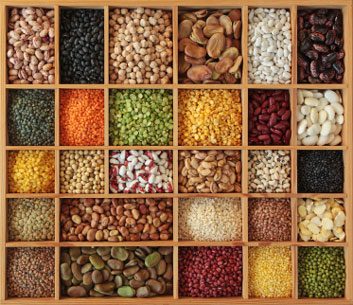
Beans, lentils, peas and other foods high in folate
If colon cancer runs in your family, pile your plate high with these foods. Along with fibre, they also contain vast stores of folate, a B vitamin that protects cell DNA from damage. According to a study from Harvard University, of nearly 89,000 women studied those with a family history of colon cancer who consumed more than 400 mcg of folate each day lowered their risk by more than 52 per cent compared to women who consumed just 200 mcg a day. You can get about 100 to 150 mcg just by eating a cup of chickpeas or cooked spinach. A medium orange contains about 50 mcg.
Of course, it pays to get more folate even if you don’t have a family history of colon cancer. Several studies show it could cut your risk by 40 percent.
Aim for: 400 mcg of folate daily. You may be getting that much already if you take a multivitamin each day or start your morning with orange juice and a fortified cereal. But you can also get there by eating at least 5 servings of whole grains each day along with 7 to 10 servings of fruit and vegetables. At least one of those servings should be dark leafy greens or legumes, such as kidney beans, black beans or chickpeas (also called garbanzo beans).
Helpful hint: Broccoli does two jobs as a cancer fighter. It contains the antitumour compounds found in cruciferous vegetables as well as a fair amount of folate.

Milk
You know the saying “milk does a body good”? Along with building strong bones, milk can help shield you from colon cancer. Data on more than a half million people showed that drinking at least a cup a day lowered the risk of cancers of the colon and rectum by about 15 percent. Drink two more glasses, and your risk drops by another 12 percent.
Aim for: At least 250 mL (8 ounces) a day.
Helpful hint: Because saturated fat is linked to tumour growth, opt for low-fat or skim milk.
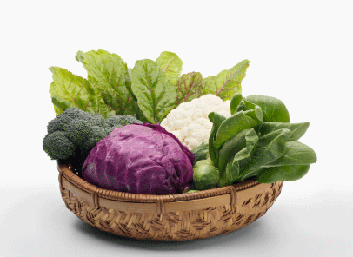
Cruciferous vegetables
These vegetables (which include broccoli, broccolini, Brussels sprouts, cauliflower, cabbage, bok choy, kale, parsnips, turnips, rutabagas and kohlrabi) are among the most powerful cancer fighters in the garden. They contain an array of compounds that flush out cancer-causing substances before they cause damage to cell DNA. Studies have consistently shown that people who eat cruciferous vegetables have half the risk of developing colon cancer compared to those who eat the least.
If you’re fond of putting steaks on the grill, you’ll definitely want to serve these veggies with them. Compounds in cruciferous vegetables act like little scrubbing pads to clean out the carcinogens created when meats are barbecued.
Aim for: At least four ½-cup (125 mL) servings each week.
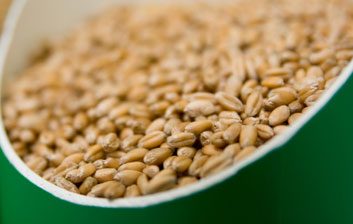
High-fibre whole grains, fruits and vegetables
The news on whether fibre protects against colon cancer flips more often than pancakes at an all-night diner. And yet, despite conflicting studies, specialists are still encouraging us to eat more than the 15 grams of fibre we typically get each day. Why? Fibre helps speed food through your digestive system, so any carcinogens you may have eaten don’t linger long enough to cause trouble. And as it’s digested by bacteria in the gut, compounds are formed that protect against carcinogenic bile acids, also produced during digestion.
Weighing in heavily on the pro-fibre side of the argument, data from a large study called the European Prospective Investigation of Cancer and Nutrition (EPIC) showed that people who ate the most fibre were 40 percent less likely to develop colon cancer.
It’s better to get your fibre from food rather than supplements because it’s not clear how much protection comes from fibre per se and how much comes from the other nutrients and plant compounds in fibre-rich foods.
Aim for: Between 25 and 35 g of fibre daily. You can get close to 25 g with three servings of whole grains – like a sandwich made with whole-wheat bread plus ½ cup (250 mL) of brown rice – and seven servings (a mere ½ cup each) of fruit and vegetables. To boost your fibre even more, add a few servings of legumes, nuts, seeds and high-fibre cereal.
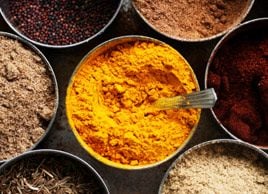
Turmeric
This is the spice so common in Indian food. The natural yellow pigment in turmeric, called curcumin, is considered a top anticancer agent. It’s strongly anti-inflamatory, quelling inflammation that’s thought to contribute to tumor growth. It also helps clean out carcinogens before they can damage cell DNA, and it helps repair any damage already done. Lab studies show this spice also helps stop the growth and spread of cancer cells that do form.
Aim for: There’s no established recommendation; just try to use it more often in your cooking.
Helpful hint: Although the turmeric in curry powder mixes can turn your food yellow, some research suggests that several commercial curry powders don’t actually contain much curcumin. It’s better to use turmeric powder or, if you’re using premixed curry powder, add some extra turmeric.
Fish and chicken
As evidence of a link between red meat and colon cancer mounts, you may wonder what’s left to eat. The answer: fish and chicken.
Results from the EPIC study show that eating at least 300 g (10 ounces) of fish (two or three servings) weekly lowers the risk of colon cancer by 30 percent compared to eating fish less than once a week. That’s not so surprising. If you’re eating more fish, you’re eating less meat. And if you choose fatty fish such as salmon or mackerel, you’re also getting more omega-3 fatty acids, which help to reduce inflammation in the gut.
If you don’t like eating fish, try chicken. Studies show that unlike red meat, chicken doesn’t actively promote colon cancer.
Aim for: At least two servings of fish or chicken a week.
Helpful hint: Most of chicken’s fat is in the skin, so remove the skin before cooking.
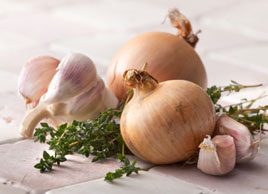
Garlic and onions
Garlic may not protect you from vampires, but it can help keep colon cancer away. Both garlic and onions contain sulfides, which help to clear our carcinogens and force cancer cells that do develop to self-destruct. In the Iowa Women’s Health Study, women who consumed one to two cloves of garlic per week had a 32 per cent lower risk of colon cancer compared to women who rarely ate garlic. And according to a study that examined fruit and vegetable consumption among more than 650 people in South Australia, onion eaters reduced their risk by 28 to 52 percent.
Aim for: Eating a couple of garlic cloves and about ½ cup (125 mL) of onions at least a few times a week may help lower your cancer risk.
Helpful hint: If you plan to cook garlic, chop or crush the cloves first, then let them stand for 10 to 15 minutes to give the therapeutic compounds a chance to form.
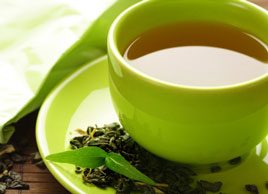
Black and green tea
The next time you’re jonesing for a hot cup of somethin’, make tea your choice. Lab studies show that the compounds in tea help disable cancer-causing agents. They also stymie the growth of cancer cells and encourage them to self-destruct.
Among more than 35,000 women in the Iowa Women’s Health study, those who drank two or more cups of tea each day were almost 30 per cent less likely to develop colon cancer than those who rarely drank tea. And while they primarily drank black tea, it’s worth noting that green tea contains even more of the antioxidant compounds, called catechins, that appear to work the magic.
Aim for: Three to four cups a day.
Helpful hint: Brew your own tea. Commercial bottled teas generally contain less than 5 percent of the antioxidant compounds found in brewed tea.
Related:
• How to keep your colon healthy
• What’s inside your colon
• Can colon cleansing improve your health?
